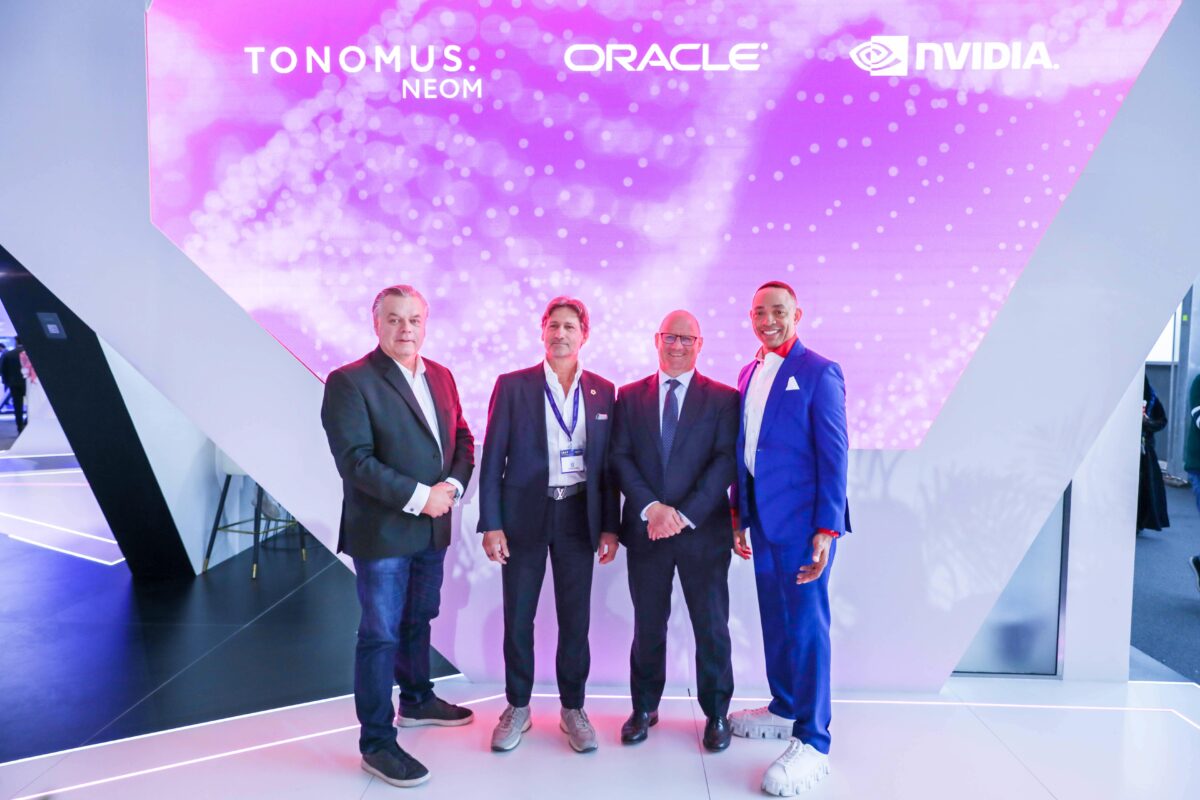The LEAP technology conference in Riyadh, Saudi Arabia, is continuing its innovative program with a powerful second day of events.
Having made an impressive debut, LEAP23 has proven itself as the place to be in the Saudi Arabian capital as the conference continues to climb to new heights throughout the second day of its agenda.
Under the umbrella theme of ‘into new worlds’, the second day of proceedings at the LEAP technology conference addressed every dynamic of what collaboration in technology really means.
With The Fintech Times among the healthy attendance at the conference, here’s everything to take away from the second day of LEAP:
TONOMUS forms AI alliance to power cities of the future
Perfectly aligning with the second day’s agenda of technology collaboration, TONOMUS, the cognitive multinational conglomerate and the first company to be established as a full-fledged subsidiary of the smart city development NEOM, confirmed its alliance with the American computer technology corporation Oracle and NVIDIA, a key manufacturer of graphics processing units (GPUs) at LEAP23 today.
The collaboration aims to deliver AI capabilities across NEOM and Saudi Arabia. As a result, TONOMUS customers will now have access to NVIDIA’s AI-powered digital twin solutions in conjunction with the Oracle cloud infrastructure (OCI) based at the NEOM smart city. The OCI is to be hosted by the ZeroPoint DC hyper-scale data centre and via TONOMUS’ digital cloud platform; an initiative also debuted at LEAP23.
NVIDIA’s computing stack, combined with OCI’s public cloud services and AI cloud infrastructure of bare metal and RDMA cluster networking and storage, will provide NEOM-based enterprises with access to a portfolio of options for AI training and deep learning inference at scale.
The availability of the NVIDIA AI platform will grant businesses that make NEOM their home the benefits of essential processing engines for each step of the AI workflow, from data processing and AI model training to simulation and large-scale deployment.

An alliance for AI
“The longstanding alliance between Oracle and NVIDIA complements TONOMUS’ ongoing mission to build the infrastructure and ubiquitous connectivity required to enable the world’s first ecosystem of cognitive technologies,” explains TONOMUS CEO, Joseph Bradley.
“This monumental collaboration will empower NEOM with geographical advantage and place Saudi Arabia firmly on the map as a regional hub for the provision of AI capabilities, as well as further support Saudi Vision 2030 and the Kingdom’s rapidly developing cloud market,” he continues.
Huawei continues to connect the KSA
Following the signing of its memorandum of understanding (MOU) with the Saudi Ministry of Communication and Information Technologies in December 2022, the Chinese technology giant Huawei today reaffirmed its commitment to accelerating the digital economy within the Kingdom in line with its Vision 2030.
This vision focuses on diversifying the economy and aims to increase the Kingdom’s non-oil export share from 16 to 50 per cent within the next seven years.
Today at the conference’s main stage, Steven Yi, the founder and president of Huawei Middle East and Central Asia, emphasised Huawei’s crucial role in this transformative journey in his defining speech.
Throughout his speech, Yi delved into how Huawei is actively leveraging its regional position alongside its collaboration with the Ministry to further the Kingdom’s digital economy. These efforts, as Yi explains, are exemplified by the corporation’s three main areas of focus.
Huawei’s three-point plan for KSA digital transformation
The first, being perhaps the most prominent area of development, includes Huawei’s support of Saudi digital infrastructure and the cultivation of a ’10 giga society’.
“Computing power is now defining the productivity of the digital economy as a key factor that underpins the development of digital technology,” Yi said in his speech. “We will assist Saudi in developing more advanced energy-efficient green data centres in order to achieve its vision to become a global hub for computing power.”
The second point of focus for Hauwei’s operations in the KSA will revolve around making the most out of cloud technology. Yi recognises that although an increasing number of the Kingdom’s enterprises are migrating their businesses to the cloud in line with digital transformation, most remain reliant on “the basic level of flexible infrastructure and resources.”
To accelerate this increasing adoption in the right direction, Yi confirms that “Huawei has started building our own public cloud and infrastructure here in Saudi to help customers maximise the value of cloud services. We will support them in developing digital solutions in smart cities, in government and in enterprises that will fully leverage Huawei’s cloud capability in AI, IoT and big data analysis.”
The third aspect of the corporation’s efforts towards transforming the KSA digital will include strengthening its current ecosystem.
“We will always encourage open collaborations and share the success in Saudi Arabia,” he comments. “We will assist the partners in developing digital investment portfolios, cultivating digital talents and supporting the growth of local digital enterprises.”
“As the world goes digital, there’s so much potential out there and many challenges ahead of us. But if we work together, we can grow together and together we can grow stronger,” Yi’s speech concluded.
Paysme’s whirlwind tour of the Middle East continues
Paysme is the ground-breaking fintech super app responding to the ever-evolving needs of underserved small business communities. The app is proving integral to the acceleration of small businesses within the thriving digital economy.
The company is achieving this by consolidating core embedded financial services into the app’s single interface, giving small businesses access to mobile payments, digital banking, e-commerce, insurance, accounting, and lending services.
Sitting down with The Fintech Times at LEAP23, the app’s founder and CEO, Derek Stewart, delved into the company’s current operations within the Middle East.
New partnerships

Stewart explains that one of the main purposes for his extended visit to the region is to further develop the app’s partnerships with Mastercard and the Riyadh-headquartered point-of-sale solution Geidea; which together is forecast to expand Paysme’s reach further than ever before into the KSA and wider Middle East and North Africa (MENA) region.
Paysme has already established numerous innovative partnerships with payment companies, digital banks, accounting firms, and lenders in its home country, the UK. However, many of its partners lack the necessary license to operate in the MENA region.
In the spirit of day two’s theme of ‘collaboration in technology’, Stewart has his eye on establishing new partnerships and reinforcing existing ones while in attendance at LEAP23. “Partnering up with both payments and digital banking partners forms the next logical step first step for us,” he confirms.
Regional suitability
Estimates suggest that the MENA region currently houses approximately 24 million small businesses. Discussing the app’s suitability in meeting the fintech needs of this expanding and crucial community, Stewart explains how Paysme is actively bridging the gap between small businesses and the financial capabilities they desperately desire.
“Most small businesses are the engine of the economy, but often they’re fragmented and underserved,” Stewart says. “And if you look at the Middle East, you’ve got different regions, different currencies and many different geographies.
“And so really, this region, particularly at the SME level, is really underserved when it comes to aggregated financial services. We see an opportunity to bring mobile payments, digital banking, e-commerce, insurance, accounting and lending all in a single platform but working with local partners, whether that be local banks, local payments, companies, or local insurers, to create this one-stop shop for small businesses.”
Stepping into the MENA market
In addition to this ambition, Stewart’s visit to the region is also to support Paysme’s ongoing application with the Dubai International Financial Centre (DIFC) for an innovation trade licence.
The purpose of this newly-introduced licence is to enable companies that have a proven product, which Paysme has already demonstrated with its sky-high success in the European market, to come to market more quickly and create a proof of concept in the region.
Stewart confirms that the app has already satisfied the DIFC’s pre-application process, and throughout his visit to the region, which will include a visit to neighbouring Dubai, he will continue to oversee the next stage of this process, which Stewart anticipates will take between six to eight weeks.
Following the company’s latest appearance at LEAP23, Stewart is continuing to expand Paysme’s presence in the wider MENA region with numerous strategic meetings in Dubai, Riyadh and Abu Dhabi.




